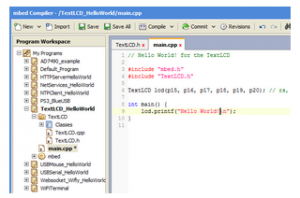ARM’s mbed Cloud Internet of Things Device Platform is a cloud computing software-as-a-service solution for the Internet of Things, which aims to offer a scalable and customisable solution for IoT device management challenges, providing all the tools you need for large-scale cloud-based IoT solutions at your fingertips.
It aims to help you focus your efforts on building your IoT-enabled business instead of building networks, and to accelerate the time to market for IoT products and services.
The mbed Cloud platform aims to bring IoT connectivity, security and firmware update needs together under one roof, simplifying the connectivity, provisioning, security and updates for any IoT installation, big or small, across complex networks.
It’s a complete chip-to-cloud service built for IoT applications, a full-stack solution that extends the reach of the cloud all the way down to each end-node IoT device. Using the mbed platform means you don’t need to be an expert in every aspect of IoT security, networking stacks and wireless technologies before you can see benefits from cloud-connected IoT solutions.
Developers can take advantage of the extensive ecosystems and user communities around the ARM and mbed product families, helping save you months of development work.
Furthermore, the mbed Cloud platform is tightly integrated for use with the mbed OS platform that has been developed for IoT devices running on ARM’s Cortex-M microcontroller family.
Although the use of these components is not mandatory for use of the mbed Cloud platform, choosing the mbed OS running on a Cortex-M microcontroller does potentially offer a lot of synergy in terms of an energy-efficient, bandwidth-efficient, compact, powerful and fast-to-market full-stack IoT solution from your device to the cloud.
The mbed Cloud platform offers reliable communication and data delivery based around open industry standards, and support for a wide array of embedded platforms. In particular – the mbed Cloud offers strong energy efficiency and support for low-power devices, as well as support for bandwidth-constrained devices employing efficient communication protocols such as CoAP.
Furthermore, the mbed Cloud Portal and Cloud Connect service provide powerful, secure and power-efficient device management services, built to support a diverse range of devices.
You can easily connect your devices and recognise them in any network, and then securely connect, provision and manage your devices with cloud computing services from a range of providers. 
The mbed Cloud and mbed Cloud Client can integrate easily with other cloud computing services, providing analytics and Big Data intelligence capabilities with the data collected from IoT devices. Amazon Web Services, Microsoft Azure, IBM Watson and IBM Bluemix are all supported for connectivity with mbed Cloud, for example.
The service is built to support large-scale deployments of IoT device nodes, even when these devices are resource-constrained, using unique caching mechanisms that enable brief bursts of data transmission, helping to minimise power use in wireless devices. The service is uniquely optimised for efficiency, regardless of device type, and offers easy expansion as new technologies energy.
It’s a highly scalable and future-proof IoT cloud solution that allows an organisation to track, maintain and update an ever-growing number of devices. A modular approach allows enterprises to configure the mbed Cloud platform and tailor the service as your IoT networks and needs grow and evolve.
And device management is no longer an afterthought – the mbed Cloud platform offers efficient and secure remote management for your IoT devices, including firmware management and fail-safe updates across all devices in a network.
Cloud Update allows you to roll out easy, secure, reliable and scalable software updates, with end-to-end orchestration to enable you to manage and monitor the update process across large networks. Plus, the Cloud Update provides security for firmware updates, allows authenticity to be verified, and maintains integrity and confidentiality of your firmware.
All this provides fail-safe protection against inappropriate accidental updates, and recovery features that allow devices to recover from failed or corrupted firmware updates.
The platform is designed to allow easy integration, independent of the vendor of your IoT devices. The use of simple REST APIs helps simplify integration, and accelerates proof-of-concept prototype projects.
This helps you achieve faster scaling of your IoT deployments, increased productivity and reduced time-to-market by enabling developers to work with any device. A range of open, industry-standard protocols for data connectivity are supported by the mbed Cloud platform, including CoAP, HTTP and OMA LWM2M (Open Mobile Alliance Lightweight M2M).
Internet of Things devices communicate via REST APIs, via the cloud platform, to your enterprise software and web apps. Solid end-to-end security is provided, including TLS and DTLS security support for the transport layer.
Cloud Provisioning is one key component of the mbed Cloud platform, providing trusted device authentication, on-boarding of new devices into the network, and service provisioning. You can set up devices with security credentials, and assign and control the rights that different apps must access IoT devices in the network.
The Cloud Provision feature lets you manage which different trusted parties or applications can access data from sensors and devices, bolstering security across the full IoT stack from the chip to the cloud.
Overall the mbed cloud platform is one of a seemingly infinite number of options for your existing or new Internet of Things platform. Making the right choice for your needs can be daunting, so consider turning to the experts in the field – the LX Group.
We’re ready to help bring your existing or new product ideas to life. Getting started is easy – click here to contact us, telephone 1800 810 124, or just keep in the loop by connecting here.
LX is an award-winning electronics design company based in Sydney, Australia. LX services include full turnkey design, electronics, hardware, software and firmware design. LX specialises in IoT embedded systems and wireless technologies design.
Published by LX Pty Ltd for itself and the LX Group of companies, including LX Design House, LX Solutions and LX Consulting, LX Innovations.

